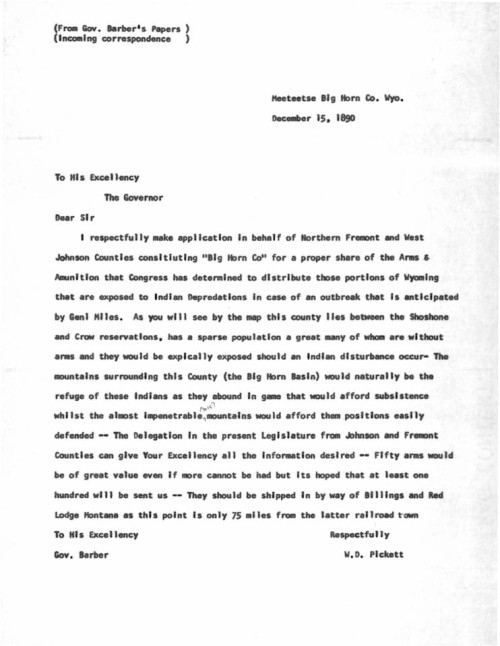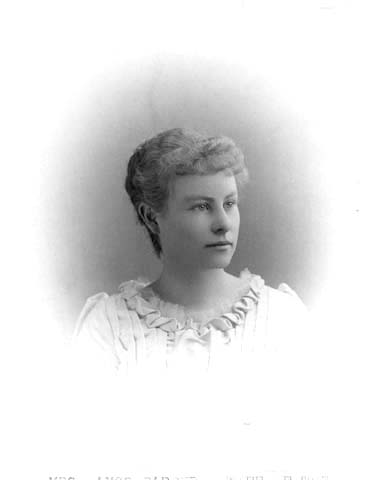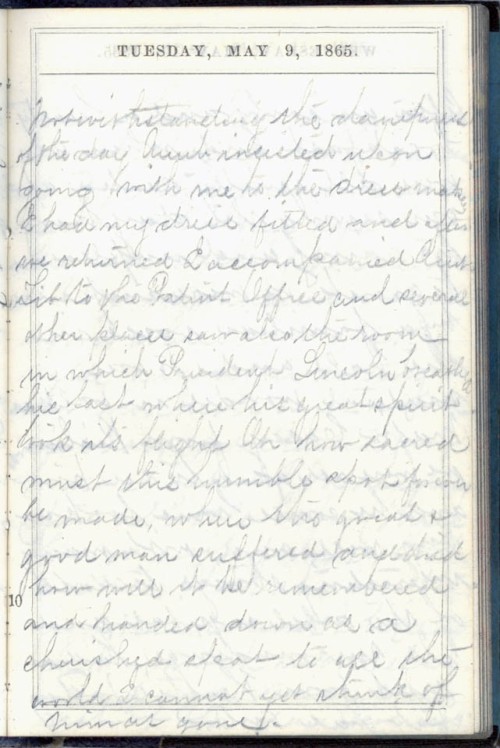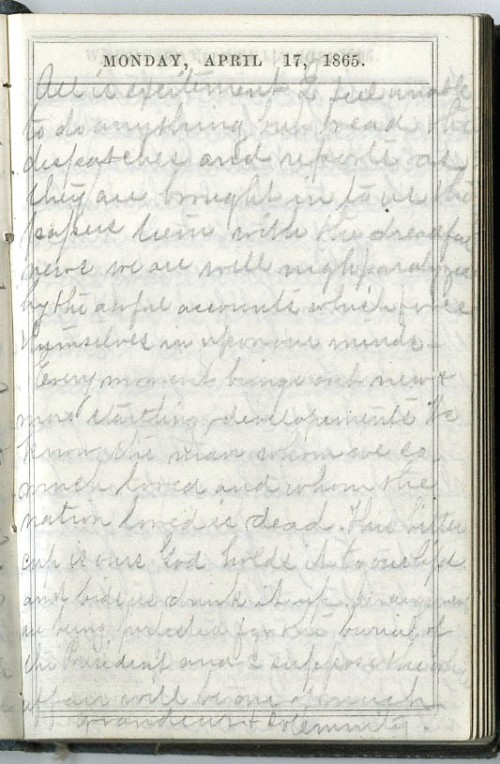We continue this month’s series of diary entries from Isabella Wunderly Campbell, who became Wyoming’s first lady in 1872. Isabella was a 19-year-old living in Washington, D.C., during the eventful April of 1865. Her daily diary entries give insight into her experiences during the final days of the Civil War, which ended 150 years ago this month.
April 2-9
April 10
April 11
April 12
April 13
April 14
April 15
April 16
April 17
April 18

April 19, 1865
(WSA Isabella C. Wunderly diary, Campbell Collection, C-1049)
Wednesday, April 19, 1865
The funeral of our late Chief Magistrate took place this morning. It would be impossible to describe the scenes which surrounded it, at an early hour the throng on the streets was immense. [Pennsylvania] Ave being lined on either side with crowds of people. Aunt and Mother and myself went to a good point in the avenue to have a view of the procession. It was the most solemnly grand imposing display that could be conceived of and must have been several miles in length. The body was conducted to the Capitol where it will remain in state tomorrow and then be conducted through the principal cities of he Union to his last resting place, Lexingfield, Ill.
There are a couple of inaccuracies in today’s diary entry. Lincoln was not technically our Chief Magistrate as that title is usually reserved for judges and he was to be buried in Springfield, Illinois.
Isabella was not the only person with Wyoming connections to watch the funeral, Alonzo Richards was there too. Richards was a 2nd lieutenant stationed with the U.S. Signal Corps in the Washington, D.C., area and would later help survey Wyoming Territory’s southern and western borders. His brother, William A., who was also part of the survey party, would be elected governor of Wyoming in 1894. Following the funeral, Alonzo wrote a lengthy letter to his parents, Mr. and Mrs. Truman P. Richards, who were living in Hazel Green, Wisconsin. According to the letter, he enclosed a piece of crepe torn from the funeral carriage to “deposit with our other relics.”
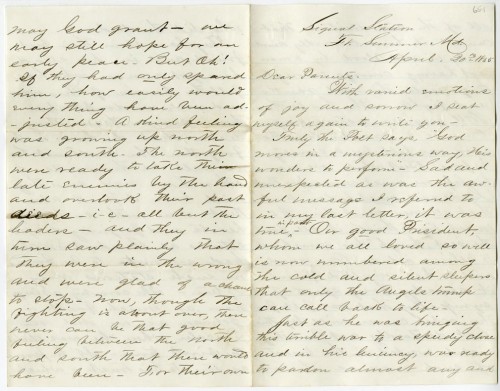
First page of the letter from Alonzo V. Richards to his parents describing President Lincoln’s funeral. There are 3 pages, written front and back.
(WSA H82-61/65-1)
Signal Station
Ft. Sumner, Md.
April 20th, 1865
Dear Parents,
With varied emotions of joy and sorrow I seat myself again to write you – Truly the Poet says, “God moves in a mysterious way, His wonders to perform” – Sad and unexpected as was the awful message I referred to in my last letter, it was true in part – Our good President whom we all loved so well is now numbered among the cold and silent sleepers that only the Angels trump can call back to life.
Just as he was bringing this terrible war to a speedy close and in his leniency, was ready to pardon almost any and all of the vile factions that caused it, he is cowardly murdered in cold blood by a man not having courage enough to go into the rebel ranks and fight with his brothers. Well may our nation say “Ours is a greater loss than ever was felt by a country before.” But while we mourn his loss, we must remember that “God’s will must be done” and that all men must die. We must try to think it all for the best, though this seems hard to believe indeed. One good, will or has resulted from it already. Every spark of sympathy that was felt for the rebel cause will by this dastardly act be extinguished except in the breasts of such men as the one who did the deed.
They have slain their best friend, and in his stead have got a man who has felt the horrors of this war and will no doubt show them sooner than they desire, that he has not forgotten the treatment he as well as thousands of others have rec’d and they will learn I think also that men with such large hearts and forgiving dispositions as President Lincoln had, are not to be found in such stations very often. The country at large have as much faith in Johnson as we did in Lincoln when he was elected the first time. If he proves as true to his trust – Which may God grant – we may still hope for an early peace. But Oh!
If they had only spared him, how easily would every thing have been adjusted. A kind feeling was growing up north and south. The north were ready to take their late enemies by the hand and overlook their past deeds – i.e. all but the leaders – and they in turn saw plainly that they were in the wrong and were glad of a chance to stop. Now, though the fighting is about over, there never can be that good feeling between the North and south that there would have been. For their own sakes, I hope the Rebel authorities can clear their skirts of this foul deed but am afraid they can not.
The funeral ceremonies took place yesterday and were very imposing indeed. The procession was the largest I ever witnessed and in addition the pavements, housetops, windows, doorways, and every accessible place from 17th Street to the Capitol were literally packed with people. I do not hesitate to say there was 100,000 people on the Avenue beside the procession.
The military display was grand indeed. And all the different orders, associations, societies, etc. were out in their respective uniforms and regalias. Everything was orderly and still hardly a word spoken as the cortège moved up the avenue to the slow time of the solemn dirge.
The funeral car was a magnificent affair and towered far above everything else so that all could see the coffin. The car was surmounted by a beautiful eagle in bronze, with wings extended and draped in solemn mourning. Every house and tenement of every kind – negro shanties and all – exhibited something to show their respect. It was the most solemn looking city I ever saw and I never wish to see another such sight. The bells were all slowly tolling and three different batteries were firing minute guns. As soon as we arrived at the Capitol we dispersed and I came home. The whole nation was ample in its exhibitions of respect as every state was represented. I hope I may never have to attend at another such occasion.
As the funeral car passed Gen. Angus Hd. Qrs. a limb of one of those trees in front caught and tore the crape off the eagle. This was when it passed in the grounds to receive the coffin. I had a great desire to possess that piece of crape. While I was trying to think of some way to get it, an officer sent a cavalryman with a whip and he got a part of it – a piece still remained. I found a piece of board 2 in. wide and long enough to reach – drove a nail in the end for a hook, rode out in the Avenue and stopped under the limb. There were thousands of people looking at me and it was still as a church. I reached several times and at last succeeded in getting the coveted relic. Several voices behind me said as it came down “he’s got it.” I shall send you a piece of it to deposit with our other relics. Take good care of it and under no considerations divide it with anyone. I will keep a piece and to those that want it who are worthy I will send a piece but do not promise anyone certain that you will give them a piece.
Friday. 11 o.c. PM
Rec’d your good letters of the 17th. The sad news had reached you when you wrote. I do not think President Lincoln was to be blamed for being at the Theatre since he went wholly on account of it being advertised and because the people wanted to see him. He went to gratify the public. You will be glad to learn that no fears are being entertained of Mr. Seward’s recovery. The other members of the Cabinet keep very close. President Johnson and Gen. Grant were on the Avenue yesterday on food, and unattended by any one, which I think is wrong.
I am sorry – ashamed to hear that the loyal citizens of the Green would allow any such creatures to live – or at least to remain in town, after exalting over this awful calamity – as Frank Chandler – A man on 6th St. made about the same remark to a sentry and the next instant an ounce of cold lead crashed through his brain from the sentry’s musket and his soul winged its way – straight to Hell. It was right, too. Serve them all so. If a man tells me in earnest that it is a “good job” that Booth done, I’ll do a better one the next minute. Not only is it a great calamity, but henceforth and forever, as long as an American lives on the Earth, he has to remember that he had a President murdered! Just think of it – Talk about Mexicans and barbarians. They are no worse than we are – Abraham Lincoln – the best President we ever had, murdered. I can’t help thinking of it. Moreover, the assassin is still at large, and when we do catch him, we are not able to punish him according to his deserts.
But it is late and I will close for tonight – Good night.
Saturday – Beautiful day – Well Pa! I am agreeable in regard to the 7.30 Bonds. Expect we will be paid again in ten days or two weeks and then I will forward by express what I can spare. No Mother I was not at the Theatre that night, because I did not see the notice that the distinguished party was to be there. If I had I should have gone there to see them. Now I would like to have been there and had it in my power to stop that miserable demon. Kerr is ready to start so will bid you adieu for this time. As ever Love
P.S. I shall send you some papers – preserve them – Enclosed find crape above mentioned A.V.R.
Much obliged for your letters Autie [brother Austin C.?] I can not answer them separately. Am always glad to hear from you. So Willie [brother William A.] likes it at O.M.’s. OK. Every one to their taste. Suppose he does not care for the way Orson has used the rest of us.
